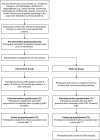Protocol for randomized control trial of a digital-assisted parenting intervention for promoting Malaysian children's mental health
- PMID: 36211835
- PMCID: PMC9541885
- DOI: 10.3389/fpsyg.2022.928895
Protocol for randomized control trial of a digital-assisted parenting intervention for promoting Malaysian children's mental health
Abstract
Background: Mental illness among Malaysian children is gradually reaching a fundamentally alarming point as it persistently shows increasing trend. The existing literature on the etiologies of children's mental illness, highlights the most common cause to be ineffective or impaired parenting. Thus, efforts to combat mental illness in children should focus on improving the quality of parenting. Documented interventional studies focusing on this issue, particularly in Malaysia, are scarce and commonly report poor treatment outcomes stemming from inconvenient face-to-face instructions. Consequently, proposing an accessible online and digital-assisted parenting program is expected to reach a larger number of parents, as it can overcome substantial barriers. Hence, this study aims to develop a universal digital-assisted preventive parenting intervention called DaPI, that aims to enhance mental health of children in Malaysia.
Methods: A total of 200 parents of children aged 10-14 years will be recruited and randomized into two groups either intervention or waitlist-control based on a 1:1 ratio for a duration of 8 weeks. Those in the intervention group will receive eight sessions of the DaPI program that focus mainly on parenting and children's mental health. The primary outcome of this study will essentially focus on the changes in parent-reported parenting behavior and parental self-efficacy. The secondary outcome will be changes in children's mental health (i.e., behavioral problems and emotional maladjustment). Assessments will be arranged pre- and post-intervention as well as at the 1-month follow-up. Analyses will be conducted using a paired t-test and multivariate analysis of covariance.
Discussion: The expected outcome will be the establishment of DaPI in promoting children's mental health by targeting changes in parenting behavior and parental self-efficacy in Malaysia. Findings from this study will be beneficial for policymakers to invest in parenting programs that could provide support to parents in enhancing their child's overall development.
Clinical trial registration: [www.irct.ir], identifier [IRCT20211129053207N1].
Keywords: Malaysia; children mental health; digital-assisted intervention; online parenting intervention; parenting.
Copyright © 2022 Zulkefly, Schaff, Zaini, Mukhtar, Norowi, Dahlan and Said.
Conflict of interest statement
The authors declare that the research was conducted in the absence of any commercial or financial relationships that could be construed as a potential conflict of interest.
Figures
References
-
- Ahmad N., Shariff Z. M., Mukhtar F., Lye M. S. (2018). Family-based intervention using face-to-face sessions and social media to improve Malay primary school children’s adiposity: A randomized controlled field trial of the Malaysian REDUCE programme. Nutr. J. 17:74. 10.1186/s12937-018-0379-1 - DOI - PMC - PubMed
-
- American Psychiatric Association (2014). Diagnostic and statistical manual of mental disorders (DSM-5), 5th Edn. Washington, DC: American Psychiatric Association.
-
- Andrew L. Y. T. (2019). A comparison of Eastern and Western parenting: Programs, policies and approaches. Oxfordshire: Routledge.
-
- Baker S. (2016). Broadening the reach of evidence-based parenting interventions: Evaluation of a brief online version of the Triple P (Positive Parenting Program). Ph.D. dissertation. Brisbane, QLD: University of Queensland.
LinkOut - more resources
Full Text Sources


